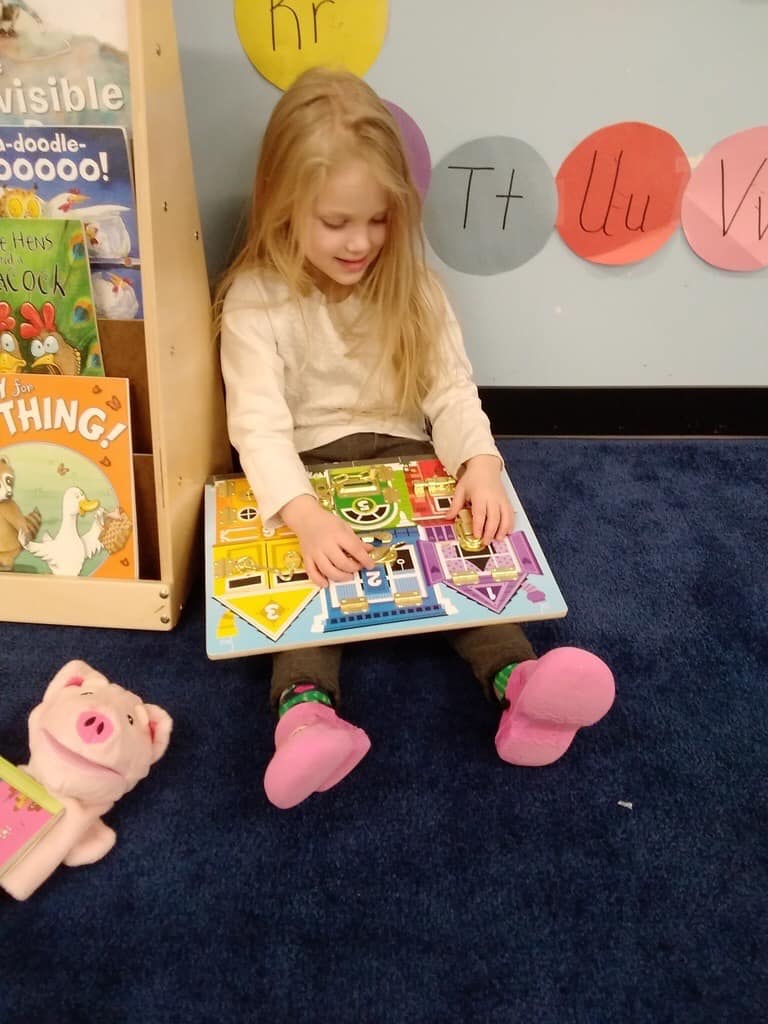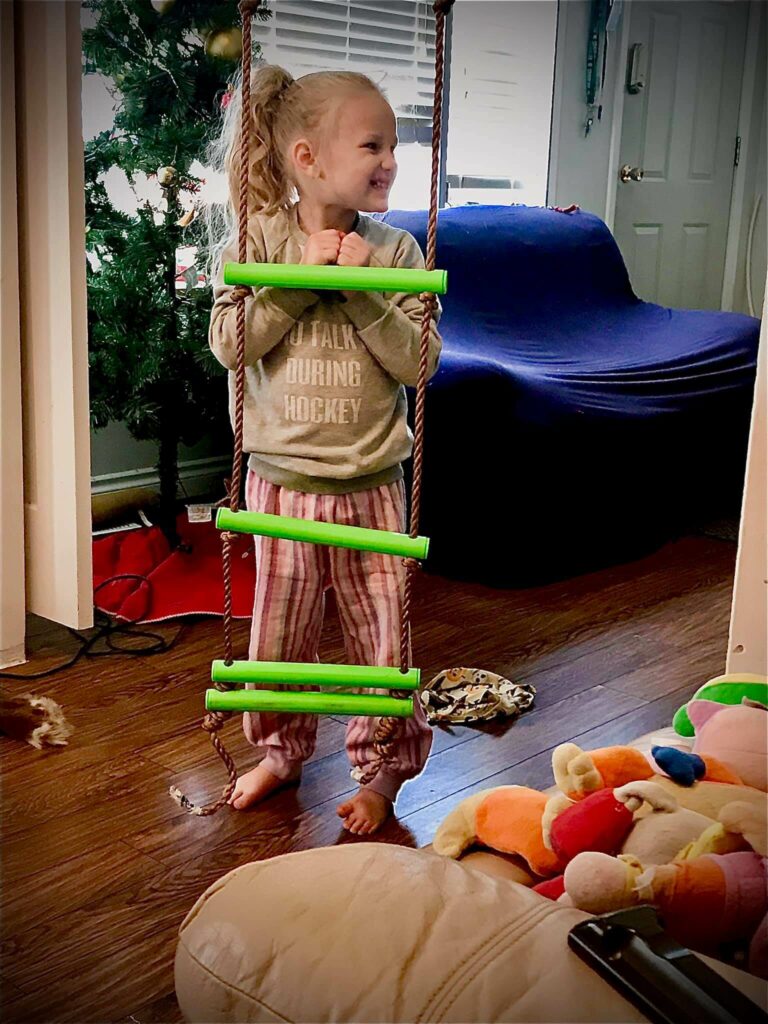You Don’t Have to Earn the Right to Inclusion
Will my daughter ever have a friend?
Will other kids see how funny and smart she is even if she never speaks? Will they tease and ignore her? Will they be scared of her?
When she gets older, will she join a team or a club? Will she meet a kindred spirit who sees her for all that she is and what she can do, instead of who she isn’t and the things that she can’t?
Most parents worry about their kids belonging at some point in their parenting journey, but I thought about inclusion all the time after my daughter Evie was diagnosed with Autism at two and a half years old.
I poured endless energy into worrying about the struggle it would be for her to find her place in the world and be accepted for who she is, especially as she gets older.

For years, I meticulously maneuvered around social situations that would draw too much attention to our differences and make it obvious we were fish out of water, trying to suck oxygen through gills where others could simply just breathe.
I spent so much energy worrying about not fitting in that I had none left over to even picture what inclusion might look like if we did happen to stumble upon it.
What it would look like for Evie, as an Autistic person.
What shape it might take for me, as her Mom and caregiver.
Then one day I stumbled into a friendship that showed me exactly what I hadn’t taken the time to envision.
It showed me that being included isn’t synonymous with ‘fitting it’, and that standing out doesn’t mean standing alone.
I met my friend Emily at a mutual friend’s 40th birthday party last year. I knew right away she was my kinda’ people: warm, funny and genuine.
My husband and I were the only couple who had lugged a child along to this party for adults, and although our amazing friends had made it clear Evie was welcome-and they meant it wholeheartedly-I still felt a little embarrassed at always having to bring Evie along, and a lot frustrated at having to spend most of the party chasing and fussing over her.
I found myself chatting effortlessly with Emily, who I had just met that night. Something about her confident vibe, our easy flow of conversation and her judgement free perspective on life made me realize how isolated I had become since Evie’s diagnosis and how lonely I was.
Evie wasn’t the only one who was struggling to find a friend, to be seen, to feel understood. I was too.
Weeks later, in a moment of bravery, I did something out of character: I reached out. I texted Emily to say hi and to buy some of her killer cinnamon buns, which she refused to let me pay for. It was as simple as that.
I got out of my own way. I dropped the front I use to keep people at a distance. I put myself out there, and I made a friend.
As excited as I was, I was also hesitant. I knew that making friends is difficult for us Mom’s of special needs kids, but keeping them around was really the hard part.
The first time I brought Evie over to Emily’s house I gave her my spiel, my pre-apology for the inevitable, for what happens every time Evie is introduced to a new home, new surroundings.
I apologized for all the things she would touch that she shouldn’t.
For the doors she would open and the rooms she would enter without permission.
For the food she might help herself to in the fridge without asking.
For the decor she would relocate in a lineup somewhere else in the house.
For the counters she would climb on and the couches she would shimmy under.
‘Don’t worry about it, it’s all good!’ Emily mused. ‘She just needs to check things out. I get it.’
Pffft, I thought.
That’s what everyone says until their favourite coffee mug ends up shattered on the floor.
This is where she’ll begin to figure out how much work it is to be my friend.
We sat and chatted as Evie circled the room, running her fingers along the table edge, rubbing a glass tumbler back and forth on her chin for sensory input. Reaching for a sippy cup that wasn’t hers.
I was on the edge of my seat ready to interfere as Evie grabbed at a guitar leaning against the wall and tried to pick it up, nearly knocking it over.
‘Uh oh, that one’s special!’ Emily said, quickly hopping up to gently pull the guitar from Evie’s hands.
I sucked in a deep breath, expecting to see her demeanour change from warmth to annoyance.
Instead I saw her leading Evie back to the chair hand in hand, bringing the guitar along in her free one.
She sat down so they were face to face and started strumming, asking Evie what she should sing even though she knew Evie probably wouldn’t answer.
Evie watched her, looking from Emily’s face to her hands on the guitar, then back up to her face again, entranced by movement and sound.
Emily sang a few notes and Evie studied her mouth for a while, then placed her hand on the guitar head to feel it vibrate, on the strings moving up and down.
I swear Evie was under a spell.
So was I, honestly!! Who was this angel woman who had calmed my child’s ever moving body just like that??
When Emily finished singing the most beautiful song, she put the guitar down and laughed and shrugged and said something along the lines of being out of practice and needing to learn a Dora song for Evie.
I was teary eyed, overwhelmed in witnessing this spontaneous connection between them, mostly because it hadn’t been prescribed, planned or manufactured by me in any way, and that was rare.
It was a conversation between the two of them, one that didn’t need words or my interference to be valuable.
I realized some important things that day.
One being, that if I continued to interfere in Evie’s social interactions so quickly and so often, I would be holding her back from honing her ability to communicate in her own unique way. I was underestimating her, and in some ways dismissing her need to build independence.
I didn’t want to do Evie that disservice any longer.
Another..
That kind hearted, open minded, good intentioned people still exist in the world.

That instead of focusing all my energy on avoiding the opposite sort, I should start investing some energy in looking for the good kind.
It was a matter of being vulnerable and opening up in order to find those ones, but they were out there nonetheless. Rejection would hurt, but not as much as the regret of walking on eggshells for a lifetime so as not to stand out.
Without the guitar to captivate her attention, Evie was suddenly bored and darted out of the room, bringing me back to reality. I instinctively started after her, but Emily stopped me.
“My kids are home and they’re responsible. I told them Evie is coming over, they’ll keep an eye on her.”
Being intuitive as she is, she could sense I was feeling nervous about that, so she disappeared around the corner for a few minutes before returning.
‘I went to talk to them. They’ll watch her, and Sarah is going to play with Evie,” she told me.
At seven, Sarah is the youngest of the three siblings and is two years older than Evie.
“I wasn’t sure how to explain this to Sarah using the right words,” Emily continued, “but I told her that Evie marches to the beat of her own drum and she might not answer questions, but to just follow Evie’s lead and not be afraid to get silly with her.
Did I do okay?”
I told her I couldn’t have explained it more perfectly myself, choking back tears again. I’m a crier, there’s no denying.
It seemed to be all Sarah needed to figure Evie out, in any case, because we didn’t hear a peep from them for over an hour.
When I peeked in to check the first time, I witnessed Evie playing among a herd of kids, happily weaving between them with a string dangling from her hand, as usual, and joy on her face.
The next time, she was climbing bunk beds with gusto, Sarah giggling not far behind her trying to keep up.
At Emily’s house, there is no pressure on us to try to be anything but ourselves, in all our chaotic glory. No mess we make is too big to be cleaned up with a shrug and a smile.
I can’t pretend that navigating a one size fits all society has suddenly gotten easy for us since my realizations that day.
I can say, that it’s been freeing to figure out inclusion is not something you have to earn a right to, by fitting in.
For us, inclusion is being free to stand out, and to do it among friends.

Written by, Jill Kakoske
Jill Kakoske is wife, middle school teacher, lover of pets and Mom to one daughter, Evie, who is Autistic. She lives in small town Saskatchewan, Canada, and enjoys spending time reading, relaxing with friends and family and writing about her experiences being Evie‘s mom. You can find her on Instagram and Facebook under Evie The Explorer or check out her website www.evietheexplorer.com
Interested in writing for Finding Cooper’s Voice? LEARN MORE
Finding Cooper’s Voice is a safe, humorous, caring and honest place where you can celebrate the unique challenges of parenting a special needs child. Because you’re never alone in the struggles you face. And once you find your people, your allies, your village….all the challenges and struggles will seem just a little bit easier. Welcome to our journey. You can also follow us on Facebook, subscribe for exclusive videos, and subscribe to our newsletter.

